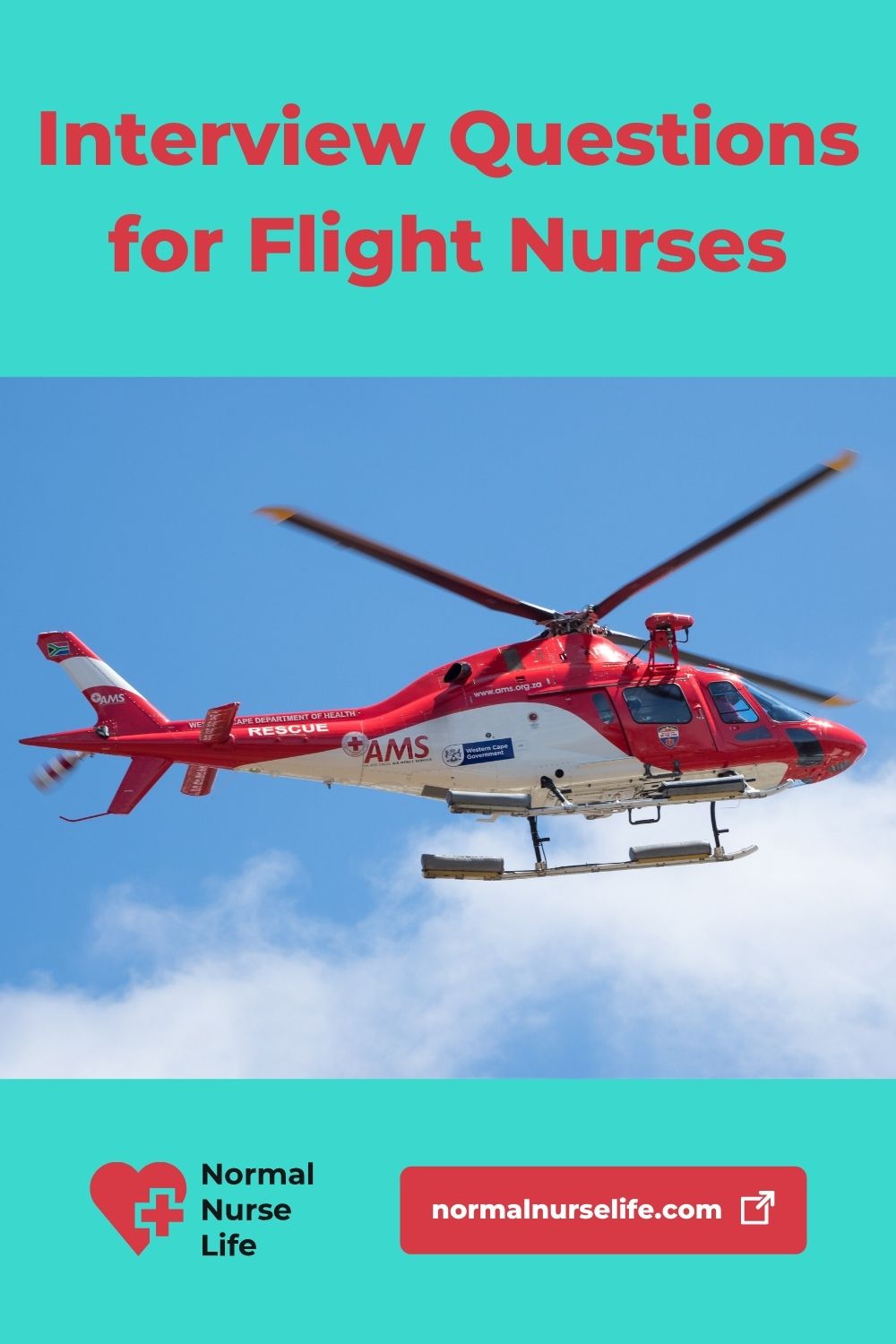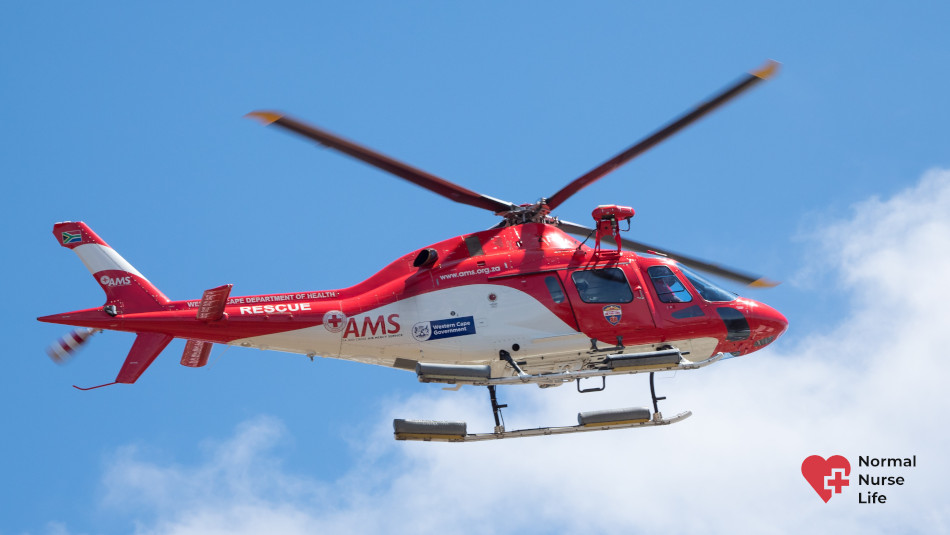So you’re interested in becoming a flight nurse? That’s great! There are many reasons to become a flight nurse, but chief among them is the opportunity to care for patients in unique and challenging settings.
Before you can become a flight nurse, you’ll first need to go through the interview process.
In this article, we’re going through the 10 most common flight nurse interview questions and answers to help you out with your interview.
Flight nurse interviews are tailored around assessing your ability to meet the specific demands of the job.
According to the job description, you can expect questions about your experience working with critically ill patients, managing difficult medical situations, and dealing with stress.
In addition to standard interview questions, you may also be asked situational questions that explore how you would handle specific scenarios you may encounter on the job.
It’s important to be prepared for these types of questions, as they can be difficult to prepare for in advance.
All these questions are designed to help the interviewer determine if you have the skills and experience necessary to be a successful flight nurse.
Fortunately, you do not have to be perfect to land the job.
The interviewer is looking for potential, not perfection.
However, being able to demonstrate that you have the qualities necessary to be a flight nurse will greatly increase your chances of being offered the position.
How can you best prepare for a flight nurse interview?
First, familiarize yourself with the job description and make sure you understand the key duties and responsibilities of the position.
Next, review common interview questions and practice answering them.
Finally, consider how you would handle difficult or challenging scenarios.
By preparing for these types of questions, you’ll be better equipped to demonstrate that you have the qualities necessary to be a successful flight nurse.
The bottom line is that flight nurse interview questions are no different than any other job interview questions.
It’s all about demonstrating that you have the skills and qualities needed to be successful at the job.
Before you head straight to the sample flight nurse interview questions, I highly recommend that you watch this video on what you need BEFORE you apply.
So, what are the most common flight nurse interview questions? Those are coming up next.
Pin me on Pinterest!

Table of Contents
The Most Common Flight Nurse Interview Questions and Answers
When attending a flight nurse interview, don’t be surprised if you’re asked a question that seems a little out of the ordinary.
It’s important to think on your feet and demonstrate that you have both the medical knowledge and the interpersonal skills necessary to care for critically ill patients in unique settings.
This can require some creativity, so being able to think quickly is essential.
That being said, you can expect to be asked some standard questions during your flight nurse interview.
These are some of the most common flight nurse interview questions:
1. What motivated you to choose a career as a flight nurse?
When an interviewer asks this question, they are looking for a response that shows that you are driven by passion and the desire to help others.
Therefore, your answer should highlight your desire to care for patients in challenging and unique settings. Give a scenario from your past that demonstrates this passion.
Example answer:
I’ve always been drawn to careers that allow me to help others, and I think flight nursing offers a unique opportunity to do just that.
I’m motivated by the challenge of caring for patients in difficult and unpredictable settings, and I know that I would be able to make a real difference in their lives.
See also: Is Nursing for Me Quiz
2. What experience do you have working with critically ill patients?
This question is designed to get a sense of your experience working with high-risk patients.
When answering, be sure to highlight any relevant experience you have, whether it’s in the hospital setting or in another type of critical care environment.
Example answer:
I’ve been working as a nurse for over 10 years, and I’ve had a lot of experience working with both stable and critically ill patients.
I’ve worked in hospitals, long-term care facilities, and home health agencies.
I have successfully handled a wide variety of critical care situations, and I’m confident that I would be able to do the same as a flight nurse.
See also: Home Health Nurse Interview Questions
3. What do you know about the role of a flight nurse?
This question is designed to gauge your level of understanding about the role of a flight nurse.
When responding, be sure to highlight your knowledge about the duties and responsibilities of a flight nurse.
In addition, be prepared to discuss the challenges and rewards of the job.
Example answer:
A flight nurse is an advanced practice registered nurse who provides medical care to critically ill patients during helicopter or fixed-wing transport.
I know that this is an extremely challenging role because the environment can be unpredictable, but it’s also very rewarding to know that you’re making a real difference in patients’ lives.
See also: Nursing Interview Questions and Answers
4. What are your strengths?
When the interviewer asks this question, they are trying to get a sense of your strengths as a nurse.
Therefore, when answering the question be sure to highlight the qualities that make you an excellent flight nurse, such as your ability to stay calm under pressure and dedication to patient care.
Example answer:
I pride myself on being a highly skilled and experienced nurse.
I’m able to think on my feet and handle difficult situations with ease.
I’m also very passionate about patient care, and I firmly believe that every patient deserves the best possible care.
5. What is your greatest weakness?
This question can be difficult to answer, but it’s important, to be honest.
When responding, try to choose a weakness that is not critical to the role of a flight nurse.
For example, you might mention that you are a perfectionist, or that you have a tendency to take on too much work.
Example answer:
I would say that my greatest weakness is that I tend to take on too much work.
I’m always looking for ways to improve my skills and contribute more to the team, and sometimes I can be a bit of a workaholic.
I’m working on it though!
See also: Tell Me About Yourself Nursing Interview
6. What is the job of a medical flight team?
This question is designed to test your knowledge of the role of a medical flight team.
When responding, be sure to discuss the duties and responsibilities of a flight nurse, as well as the role of the pilot and other crew members.
Example answer:
A medical flight team is made up of a crew: a pilot, a nurse, and occasionally other medical staff.
The nurse is responsible for assessing and providing care to the patient during transport, as well as planning any necessary interventions en route.
The pilot navigates the helicopter or fixed-wing aircraft and avoids obstacles such as bad weather and radio towers.
I’m also aware of what happens on the ground.
That involves communication between the receiving hospital and the helicopter team, as well as tracking the transport and arranging an ambulance to transfer the patient from their home to a landing zone.
7. How do you stay educated on new medical procedures and protocols?
If the interviewer asks this question, they are likely looking for nurses who are committed to lifelong learning.
When answering, be sure to highlight your ongoing efforts to stay up-to-date on the latest medical procedures and protocols.
See also: Do Nurses Have to Do Continuing Education?
In addition, you might discuss your experience with continuing education courses or online modules.
Example answer:
I am always striving to learn new things and maintain my skills.
I regularly attend continuing education courses, and I’m also a big believer in online modules.
I think it’s important to have a variety of learning tools at our disposal so that we can stay up-to-date on the latest medical procedures and protocols.
8. Why would you want to be part of our team?
When answering this question, the interviewer wants to know why you would love to work for their organization.
Highlight the qualities of their team that make you want to be a part of it, as well as the values and goals that align with your own.
Example answer:
I would very much like to become a member of your team because I believe that you have an excellent reputation in the industry, particularly when it comes to patient care.
I share your commitment to providing the best possible care for every patient, and I think that we would be a great team.
I’m also very excited about the possibility of working in a fast-paced environment where I can use my skills and experience to make a difference.
9. What are some of the challenges you foresee in this position and how would you tackle them?
In case the interviewer asks this question, they are trying to determine whether or not you have carefully considered the challenges that come with the role.
Provide an example of how you handled a challenging situation in another workplace, and be sure to explain what you learned from it.
Example answer:
I can think of many different types of challenges – for instance, when a patient has a very serious illness and is not responding to treatment.
I realize that it can be upsetting for all of us, but we have to stay focused on delivering the best care possible while handling our emotions in an appropriate manner.
10. What can we expect from you in the first 6 months?
The interviewer wants to know if you have realistic expectations for the role and if you are willing to put in the effort necessary to be successful.
Provide a brief outline of your goals for the first 6 months, as well as your plans for professional development.
See also: SMART Goals for Nursing With Examples
Example answer:
I would like to take on additional shifts in the first 6 months so that I can get a better understanding of the role and the team.
I’m also interested in taking some continuing education courses to expand my knowledge base.
And finally, I want to be a contributing member of the team who is willing to lend a helping hand whenever needed.
Conclusion: Interview Questions for Flight Nurses
Becoming a flight nurse requires a lot of training and education, but it can also be incredibly rewarding.
To be successful in this position, you need to have the right balance of compassion and composure.
Interviewers will want to know that you are committed to providing patients with the highest standard of care possible.
Use the 10 common flight nurse interview questions as a guide when prepping for your flight nurse interview.
Good luck with your interview!
Related articles of ours:
- Correctional Nurse Interview Questions
- Travel Nurse Interview Questions
- ER Nurse Interview Questions
- Interview Questions for NICU Nurses
- Nurse Leadership Interview Questions
I’d be more than happy if you could give this article a star rating. Thank you in advance!
